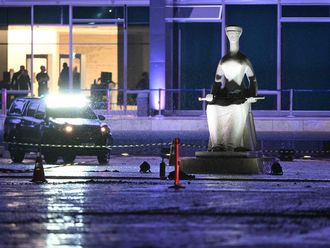Dubai The discovery of a US-bound bomb at a Dubai air cargo terminal on Friday should prompt authorities to dig deeper into the causes of a UPS jumbo jet crash outside the city eight weeks ago.
On September 3, the 747 cargo plane crashed after a fire broke out on board shortly after takeoff and its two pilots struggled to land the plane at Dubai.
The initial investigation into the crash — into a military base next to the Dubai-Al Ain Road — that killed the two pilots on impact, identified lithium batteries on board as being potentially to blame. However one terrorism expert in the US told Gulf News the investigation needed to be reviewed.
Connect the dots
"I think it would be very prudent to connect the dots in this incident," said Dr Max Abrahms, a fellow at the Dickey Centre for International Understanding at Dartmouth College and on the Empirical Studies of Conflict project at Princeton University and the Hoover Institute.
"It seems like common sense now and clearly there are similarities between the crash and this latest incident," said Abrahms, an expert on terrorism and counter-terrorist strategies.
The bomb discovered on Friday was disguised as a printer cartridge. It contained mobile phone circuitry and PETN, a highly explosive material commonly used in military ordnance.
While Dubai Police are not saying how much explosive Friday's bomb contained, a small amount of PETN has the potential to down an aircraft directly if a blast is near an aircraft's centre fuel tanks where the wings join the fuselage. Elsewhere on board, an explosion could lead to a fire rather than a catastrophic explosion.
The UPS crash eight weeks ago occurred on a Friday after the plane took off from the same area where Friday's bomb was found.
In recent weeks, authorities have been monitoring the movement of air cargo, and a tip-off by Saudi authorities to the US is believed to have prompted the most recent security alert, news reports say.
The crew of the doomed UPS plane had reported a fire on board and were attempting to land the plane when it crashed into the military camp 50 minutes after taking off from Dubai, bound for Cologne/Bonn airport in Germany. The pilots were attempting to return to Dubai after the fire warning alarms were activated 19 minutes after takeoff.
Aviation authorities in the US subsequently issued a warning over the dangers posed by lithium batteries, items on the cargo manifest which had the potential to catch fire.
Abrahms would not speculate on the effect of PETN if it exploded on board a jet, potentially setting other cargo on fire.
"That's an interesting scenario," he said. "But I think the common sense thing would be to look at all possibilities."
US security officials believe the bombs found in Dubai and at East Midlands Airport in the UK and addressed to Chicago synagogues were a dummy run by Al Qaida operatives in Yemen.












